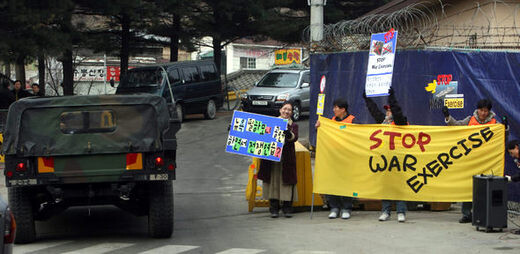hankyoreh
Links to other country sites 다른 나라 사이트 링크
U.S. solider may have gotten special treatment from Korean police

A controversy over special treatment is brewing as South Korean police remanded a U.S. soldier to the U.S. military police without questioning him properly. The solider allegedly attempted to rape a South Korean woman and was caught in Dongducheon, which is located in the northern part of Gyeonggi Province. Under the Status of Forces Agreement governing the legal status of U.S. troops in South Korea, South Korean police do not have to send U.S. rape or murder suspects who have been caught at the scene of a crime back to the U.S. military police for questioning, giving rise to speculation that the solider’s charges will be reduced.
At around 11:00 p.m. on July 4, police officers arrested the 19-year-old suspect, who is only identified by the letter “S,” and is a private in the U.S. Army’s Second Infantry Division, on a street in the Gwangam neighborhood in Dongducheon, for the alleged rape of the 34-year-old woman, who is only identified by the surname Lee.
Witnesses said the suspect had thrown Lee to the ground and was trying to drag her along forcefully by picking her up and grabbing her by her clothes. The suspect was caught by a group of citizens who approached after hearing the sounds of her screaming. At that time, the suspect was apparently intoxicated.
The Yangju Police Station in Gyeonggi Province took custody of the suspect on charges of attempted forced harassment and sent him to the U.S. military police after confirming his identity.
The Democratic Labor Party’s Dongducheon branch said, “This case didn’t happen while the solider was on duty, so South Korea has the right to a trial. Nevertheless, the Yangju Police Station was busy protecting the U.S. soldier. Under the law, the South Korean police should have put Pvt. S. into a detention room and questioned him after he was sober.”
Some activists worry the South Korean police may reduce the allegations against the suspect from attempted rape to a charge of attempted forced harassment. Ko Yoo-kyung, the director of the Headquarters for the Movement to Root out Crimes by U.S. Troops in South Korea, said, “If the U.S. soldier pulled along her at that time, the possibility is high that he would have attempted to rape her. Nevertheless, police handled the case as one of attempted forced harassment and sent the suspect back (to the U.S. military police).”
In response, a police officer from the Yangju Police Station said, “We just handled the case as attempted forced harassment. We couldn’t view it as attempted rape because the suspect didn’t touch Lee’s body. We weren’t in a position to question the suspect because he was drunk, so we sent him back.”
The police said they will summon the suspect by sending a legal document to the the U.S. military police on July 8.
Please direct questions or comments to [englishhani@hani.co.kr]
Editorial・opinion
![[Editorial] Yoon must halt procurement of SM-3 interceptor missiles [Editorial] Yoon must halt procurement of SM-3 interceptor missiles](https://flexible.img.hani.co.kr/flexible/normal/500/300/imgdb/child/2024/0501/17145495551605_1717145495195344.jpg) [Editorial] Yoon must halt procurement of SM-3 interceptor missiles
[Editorial] Yoon must halt procurement of SM-3 interceptor missiles![[Guest essay] Maybe Korea’s rapid population decline is an opportunity, not a crisis [Guest essay] Maybe Korea’s rapid population decline is an opportunity, not a crisis](https://flexible.img.hani.co.kr/flexible/normal/500/300/imgdb/original/2024/0430/9417144634983596.jpg) [Guest essay] Maybe Korea’s rapid population decline is an opportunity, not a crisis
[Guest essay] Maybe Korea’s rapid population decline is an opportunity, not a crisis- [Column] Can Yoon steer diplomacy with Russia, China back on track?
- [Column] Season 2 of special prosecutor probe may be coming to Korea soon
- [Column] Park Geun-hye déjà vu in Yoon Suk-yeol
- [Editorial] New weight of N. Korea’s nuclear threats makes dialogue all the more urgent
- [Guest essay] The real reason Korea’s new right wants to dub Rhee a founding father
- [Column] ‘Choson’: Is it time we start referring to N. Korea in its own terms?
- [Editorial] Japan’s rewriting of history with Korea has gone too far
- [Column] The president’s questionable capacity for dialogue
Most viewed articles
- 1Months and months of overdue wages are pushing migrant workers in Korea into debt
- 2At heart of West’s handwringing over Chinese ‘overcapacity,’ a battle to lead key future industries
- 3Seoul getting its first-ever vertical farm
- 4[Editorial] Yoon must halt procurement of SM-3 interceptor missiles
- 5Fruitless Yoon-Lee summit inflames partisan tensions in Korea
- 6Trump asks why US would defend Korea, hints at hiking Seoul’s defense cost burden
- 7[Editorial] When the choice is kids or career, Korea will never overcome birth rate woes
- 8Dermatology, plastic surgery drove record medical tourism to Korea in 2023
- 9[Column] For K-pop idols, is all love forbidden love?
- 10[Editorial] New weight of N. Korea’s nuclear threats makes dialogue all the more urgent